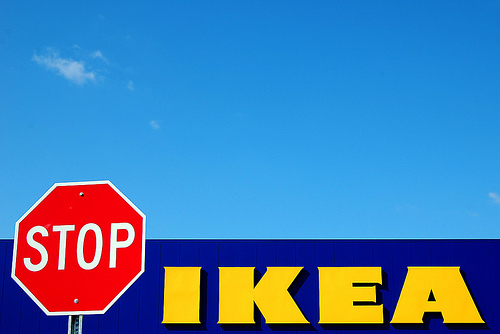After three decades of footloose production driven by the outsource-everything imperative, the storyline is familiar: an image-conscious brand operating in a repressive environment seeks to downplay workers’ complaints with assurances that all the local rules are being followed.
This particular story has a couple of twists, however. The repressive environment is the state of Virginia, where union organizers have labored mightily to get a mere 4.7 percent of Virginians protected by union contracts.
Moreover, the brand is the Swedish home-supply megastore IKEA—hailing from a land of social-democratic harmony—which boasts in its annual reports about strong and long-standing ties to the global woodworkers’ union, BWI.
And on top of it all, the $281 million factory in Virginia (known as “Swedwood”) is an actual IKEA subsidiary, not the typical supplier factory with an arms-length relationship to the brand that buys its goods.
So one might think that honoring workers’ right to organize in the “land of the free” should be a simple matter of “Just ask Kjell to phone up Bengt and Anders, OK?”
In reality, a labor journalist from the Swedish metalworkers union magazine had to jump through hoops just to pose a few questions to the Virginia factory’s manager, Bengt Lundgren. The resulting article recounts the struggle of the Machinists (IAM) union in terms that make Danville, Virginia, sound more like an export processing zone in Bangladesh or the Dominican Republic: workers terrified to meet, racial discrimination and favoritism, a worker humiliated by urinating on himself after being denied a bathroom break.
Here’s a quote from Lundgren: “I have absolutely no dialogue with the union. That's how the American system works.”
What about that much-vaunted relationship with BWI, the global union federation? The article continues: “When BWI general secretary Anita Normark visited Danville along with some of her colleagues, she had to wait two days before they let her in. Kjell Dahlström, former chairman of the union Skogs- och Träfacket, had the same problem, even though he is a member of IKEA's team for monitoring IKEA manufacturers around the world.”
Unions’ cooperation in monitoring foreign factories is a net negative. What may be won in a few cases—getting some workers back pay or a few union activists rehired—is far outweighed by the public relations benefit to the companies, who can claim they are partnering with progressive forces.
NO RIGHTS IN CHINA
In IKEA’s just-released sustainability report, the company is obviously at a loss to explain how workers in an un-free nation can organize resistance to a brutal boss. The report says the right to freedom of association is “not applicable” in China, which is IKEA’s largest source of products.
Compared to the mental gymnastics engaged in by other companies addressing this issue, this is a refreshingly honest appraisal. It should be the starting point for anyone working to improve conditions for workers anywhere—since all the world’s workers compete with China’s $3-a-day wage, party-controlled unions, and low environmental standards.
Most of the report, however, is boilerplate “corporate social responsibility” language with pseudo-scientific measurements of everything from wages and benefits to “harassment, abuse and disciplinary actions.”
Especially dubious is the 99.2 percent freedom of association ranking that IKEA gives itself for its Asian production occurring outside China (which includes fellow union-crushing states like Vietnam)—and, of course, the 100 percent score for North America, which includes Danville, Virginia.






